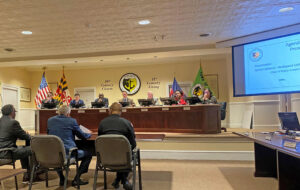
BERLIN – Town officials continue to explore the possibility of installing speed cameras in local school zones.
Representatives from RedSpeed met with the Berlin Town Council Monday to share information about how speed cameras could benefit the municipality.
“In this day and age automatic traffic controls have become more effective because they’re utilized as a law enforcement multiplier,” RedSpeed’s Kurt Zanelotti said.
Zanelotti, a principal and investor in RedSpeed, told the council the company worked with municipalities in various states to install speed cameras. In Maryland, the state only allows for the installation of cameras within school zones. Where they’re installed, however, Zanelotti said there was typically a significant drop in vehicle speeds.
Zanelotti said that once a town contracted with RedSpeed, company representatives reviewed potential camera locations in town and then set up cameras over a three- or four-day period. Statistics from that brief traffic study give them an idea of how big of a problem speeding is.
“If there’s not a problem it’s not worth us doing, it’s not worth you guys doing,” Zanelotti said.
Assuming there’s enough speeding to merit camera installation, RedSpeed works with the Maryland State Highway Administration for the necessary approvals and then installs
the cameras at selected locations.
“It’s actually no cost (to the town) to go ahead and put the cameras in,” Police Chief Arnold Downing said.
While the cameras are on 24/7, Zanelotti said they’d only record violations Monday through Friday from 6 a.m. to 8 p.m.
When a violation occurs, a motorist is issued a $40 ticket. RedSpeed will get about 40% of the revenue collected through the camera program while the town will get about 60%.
When asked what happened when tickets were challenged in court, RedSpeed’s Erwin Lanier said challenges weren’t frequent but that when they occurred he would go to court with the camera’s calibration data and any other supporting documentation.
Zanelotti said because the maximum ticket was $40 most drivers didn’t contest it. He added that when the cameras were first installed, they’d issue only warnings for the first two weeks. That gives local drivers a chance to realize they’re in place.
“Local town people, typically they abide by the law,” Zanelotti said, adding that after the initial two weeks the majority of the people ticketed were tourists unfamiliar with the town.
With no further questions from the council, Mayor Zack Tyndall encouraged Zanelotti and Lanier to communicate with Downing.
“It sounds like our next step would be compiling a list of potential areas and maybe we could have you all come out and survey those with the chief,” Tyndall said.

